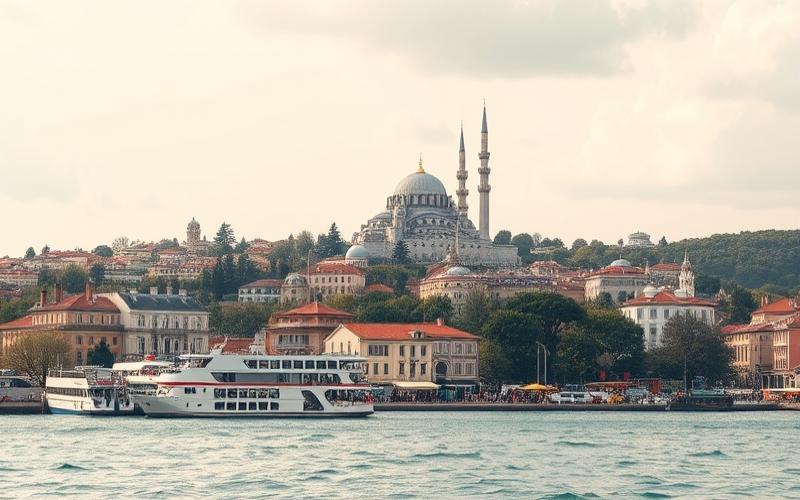
 Published on and written by Cyril Jarnias
Published on and written by Cyril Jarnias
Relocating to Turkey as an expatriate is a rewarding adventure that combines a fascinating blend of diverse culture, breathtaking landscapes, and growing economic dynamism. Whether you’re drawn to the vibrancy of Istanbul, the tranquility of the Aegean coasts, or the cultural heritage of Ankara, this essential guide will provide the necessary insights to facilitate your transition, from administrative and legal aspects to the subtleties of daily life. Discover how to easily integrate into this welcoming society while preparing to tackle the unique challenges of expatriate life.
Preparing Your Departure: Must-Dos for Moving to Turkey
List of essential administrative documents to prepare before departure:
- Valid passport (valid for at least 150 days upon entry into Turkish territory)
- Visa (if required based on your nationality and length of stay)
- Residence permit (ikamet) for an extended stay
- Work permit (if planning professional activity)
- Proof of accommodation (lease agreement or hosting certificate)
- Health insurance covering Turkey
- Financial documents (bank statements, proof of income)
- Civil status documents (birth certificate, family record book, etc.)
- Apply online for the temporary residence permit (ikamet) via the official website
- Schedule an appointment and appear at the local administration (Directorate of Migration Management – Göç İdaresi)
- After residence permit approval, register your legal address with the relevant Directorate of Migration Management
- Renew the residence permit while ensuring passport validity
Housing search and popular options for expatriates in Turkey:
- Apartment rentals in city centers or residential neighborhoods favored by expatriates (e.g., Besiktas, Kadiköy, Sisli in Istanbul)
- Secure residences (gated communities with security, green spaces, swimming pools)
- Shared housing with other expatriates or students
- Real estate agencies specializing in assisting foreigners
- Online classifieds websites and expatriate Facebook groups
Steps to open a bank account in Turkey:
- Present a valid passport and Turkish tax identification number (Vergi Numarası)
- Provide proof of residence (lease agreement, recent utility bill in your name)
- Sometimes, proof of employment or income may be requested
- Choose a bank suitable for foreigners (some offer services in English)
Health matters and health insurance coverage:
- Subscribe to private health insurance covering Turkey (often mandatory for residence permit)
- Possibility to register with Turkish social security (SGK) in certain cases after one year of residence
- Verify coverage for routine and emergency care, as well as partnerships with local healthcare facilities
- Keep a supply of common medications and translated prescriptions
Tips for cultural adaptation and learning Turkish:
- Learn basic Turkish (online courses, mobile apps, in-person classes)
- Understand local customs: politeness, importance of family, respect for traditions
- Participate in cultural events and workshops
- Be open to religious and cultural diversity
Expatriate networks and useful online resources for integration:
| Resource | Description |
|---|---|
| Expatriate Facebook Groups | Practical advice, announcements, meetups |
| Istanbul Accueil | French-speaking support network |
| Specialized websites (Expat.com, Internations) | Forums, guides, events |
| Embassies and Consulates | Official information and support |
| Messaging apps | WhatsApp or Telegram groups for expatriates |
Properly preparing these administrative procedures and relying on support networks greatly facilitates integration and daily life in Turkey.
Good to Know:
Before moving to Turkey, it’s crucial to prepare essential administrative documents such as passport, visa, and residence permit, and to inquire about formalities to complete with local authorities for an extended stay. Housing search can focus on neighborhoods popular with expatriates, like Kadıköy or Beşiktaş in Istanbul. To open a bank account, present your Turkish tax identification number, which is obtained from the local tax office. Consider subscribing to health insurance, as some policies don’t cover care abroad. Learning basic Turkish facilitates cultural adaptation and multiplies employment opportunities. Finally, joining expatriate networks and using online resources like forums or social media groups can be valuable for exchanging advice and expanding your contact circle.
Initial Steps Upon Arrival in Turkey
Administrative formalities to complete upon arrival
- Visa and entry into the territory
For European Union nationals (including French citizens), no visa is required for tourist stays under 90 days within a 180-day period. Simply present a valid ID card or passport, valid for at least 150 days after the entry date. For any stay exceeding 90 days, you must apply for a residence permit (“ikamet”) from the Göç Idaresi (Turkish immigration office) via the official online portal. - Registration with local authorities
Upon arrival for a long stay, schedule an appointment on the official website (https://e-ikamet.goc.gov.tr) to submit your residence permit application. Prepare required documents (passport, photos, proof of income, proof of accommodation, health insurance, etc.). The application must be initiated within 10 days following the expiration of the visa-free period.
Opening a bank account in Turkey
- Bring your passport, Turkish tax number (see below), proof of address (lease agreement, utility bill in your name) and sometimes a temporary residence permit or application receipt.
- Turkish banks generally require physical presence for account opening.
Procedure to obtain a Turkish tax number (Vergi Numarası)
- Visit any tax office (“Vergi Dairesi”) with your passport.
- Fill out the provided form on site.
- The tax number is issued immediately and free of charge.
Subscribing to local health insurance
- Turkish private health insurance is mandatory for obtaining a residence permit (except for those over 65).
- Several companies offer contracts tailored to expatriates.
- Insurance can be subscribed online or through a local agent.
- For access to Turkish Social Security (SGK), you must legally reside for at least one year and submit a specific application.
Housing search and procedures for public services
- Search for housing via real estate agencies, specialized platforms, or expatriate groups.
- A Turkish tax number is often required to sign a lease agreement.
- After signing the lease, arrange for connection or activation of water, electricity, and gas meters with local providers (bring the lease, tax number, and your ID).
| Procedure | Where/How? | Required Documents |
|---|---|---|
| Residence permit (ikamet) | e-ikamet portal, appointment at Göç Idaresi | Passport, photos, supporting documents |
| Turkish tax number | Tax office (“Vergi Dairesi”) | Passport |
| Bank account | Bank branch | Passport, tax number, lease |
| Health insurance | Online or local agent | ID, residence permit |
| Public utility connections | Local providers (water, gas, electricity) | Lease, tax number, ID |
Learning the Turkish language
- Enroll in courses at universities, private language centers, or cultural associations.
- Many cultural centers (Yunus Emre Institute, local universities) offer programs for foreigners.
- Use mobile apps or online platforms for complementary learning.
Cultural centers and expatriate communities
- Join French-speaking or international associations (e.g., Istanbul Accueil, Alliance Française, expatriate Facebook groups).
- Participate in events at cultural centers (Yunus Emre Institute, Alliance Française, Goethe-Institut…).
- These places facilitate integration, exchange, and access to practical information.
Useful resources
- Official residence permit portal: https://e-ikamet.goc.gov.tr
- Administrative information and public services: https://turkiye.gov.tr
- Public health and insurance portal: https://www.sgk.gov.tr
- Tax office for tax number: https://ivd.gib.gov.tr
- Housing and expatriation platforms: Istanbul Accueil, Expat.com, local Facebook groups
Practical tips
- Anticipate your administrative procedures, as some documents may require processing time.
- Consider translating and authenticating your important documents before departure.
- Always keep a copy of your passport and residence permit with you.
Learning Turkish and integrating
- Learning Turkish, even basic, greatly facilitates daily procedures and social integration.
- Participating in community and cultural activities accelerates adaptation and helps build a local network.
Key takeaway:
Methodical organization of administrative procedures, knowledge of official resources, and openness to local culture are the keys to a successful relocation to Turkey.
Good to Know:
Upon arriving in Turkey, it’s crucial to start with registration at local authorities and ensure your visa is in order; the residence permit application can be made directly on the Directorate General of Migration Management website. Opening a bank account generally requires a passport and often a tax identification number that must be obtained from the tax office. Subscribing to local health insurance can be done through international insurance companies with local partners. Regarding housing, it’s advisable to use reputable platforms or contact real estate agencies to secure a lease; also inquire about procedures for water, gas, and electricity connections through municipal services. Learning Turkish will facilitate your integration; don’t hesitate to join language courses or participate in language exchanges. To meet other expatriates, cultural centers and social media groups are good places to get information and build a network; specifically check resources available on official websites for up-to-date information.
Integrating into Local Life: Tips for Getting Started
Integrating into local life in Turkey: practical tips for getting started
- Learning basic Turkish language
Mastering essential Turkish phrases greatly facilitates daily communication, whether asking for directions, shopping, or interacting with neighbors. It also helps build more authentic connections with locals and be perceived as someone open to integration.
| Useful Expressions | Turkish |
|---|---|
| Hello! | Merhaba / İyi günler |
| How are you? | Nasılsın? |
| Thank you | Teşekkürler |
| Yes / No | Evet / Hayır |
Tip: Using mobile apps or taking local classes accelerates learning and helps progress in oral and written comprehension.
- Discovering local markets, cafes, and community events
- Frequenting markets allows immersion in Turkish daily life, learning names of typical products, and adopting certain culinary habits.
- Cafes are often the social heart of the neighborhood; going regularly promotes informal encounters.
- Participating in cultural festivals or local celebrations offers a unique opportunity to understand the culture, interact with diverse resident profiles, and sometimes even make friends.
- Respecting and adapting to local customs
- Observing how Turks behave in different situations (greetings, speaking) helps quickly adopt local codes.
- Politeness is highly appreciated: using “lütfen” (please) or “teşekkür ederim” (thank you) reinforces a positive image.
- Adapting attire according to context: preferring modest clothing during religious or family visits.
- Showing interest in local culinary traditions demonstrates sincere respect for Turkish culture; tasting tea (“çay”) is a friendly gesture often shared.
- Joining expatriate clubs or associations
- Active participation in these groups provides valuable moral support during the initial stay period.
- Sharing personal experiences also allows obtaining practical integration advice.
- These networks facilitate collective organization (outings, language workshops), while sometimes enabling meetings with Turks eager to exchange.
- Exercising patience and open-mindedness
- Cultural adaptation takes time; accept that some behaviors may differ significantly.
- Remaining curious about differences without hasty judgment greatly enriches your experience.
- Patience facilitates peaceful resolution of daily challenges related to cultural change.
Checklist:
- Learn a few useful Turkish keywords each week
- Regularly visit markets & cafes to expand your social circle
- Adopt appropriate politeness & dress codes according to context
- Actively participate in expat clubs/associations
- Always maintain curiosity & flexibility towards differences
Linguistic and cultural openness is your best asset for successful relocation to Turkey. The more respect you show towards local society, the more warmly you’ll be welcomed.
Good to Know:
Learning basic Turkish can greatly help navigate daily life in Turkey and build connections with locals, as even a few words are often enough to break the ice and show interest in local culture. Getting actively involved in the community by visiting local markets, cafes, or attending community events is an excellent way to discover the richness of Turkish culture and meet new people. Respecting local customs is essential for harmonious integration: this includes simple gestures like removing shoes when entering someone’s home, dressing modestly, and adopting Turkish politeness rules that are imbued with respect and human warmth. Participating in expatriate clubs or associations can provide good social support while allowing sharing experiences with others living abroad. Patience and open-mindedness are key to overcoming cultural differences and making the most of this enriching experience.
Disclaimer: The information provided on this website is for informational purposes only and does not constitute financial, legal, or professional advice. We encourage you to consult qualified experts before making any investment, real estate, or expatriation decisions. Although we strive to maintain up-to-date and accurate information, we do not guarantee the completeness, accuracy, or timeliness of the proposed content. As investment and expatriation involve risks, we disclaim any liability for potential losses or damages arising from the use of this site. Your use of this site confirms your acceptance of these terms and your understanding of the associated risks.


























































